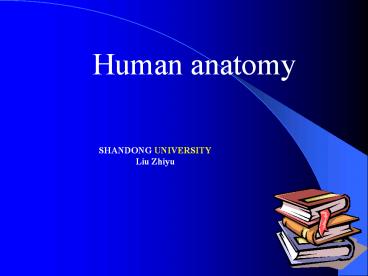Human%20anatomy - PowerPoint PPT Presentation
Title:
Human%20anatomy
Description:
Human anatomy SHANDONG UNIVERSITY Liu Zhiyu Levels of Structural Organization 3.The chemical composition and physical properties Levels of Structural Organization 3 ... – PowerPoint PPT presentation
Number of Views:305
Avg rating:3.0/5.0
Title: Human%20anatomy
1
Human anatomy
SHANDONG UNIVERSITY Liu Zhiyu
2
Introduction
3
Definition human anatomy is the science which
deals with structures and functions of the human
body, and it is the basic course of medicine
? aims
4
5
systematic anatomy regional anatomy
Surgical anatomy Sectional
anatomy Surface anatomy
X - ray anatomy X
Locomotor anatomy
6
Levels of Structural Organization
- Atoms, molecules
- Cellular
- Tissue
- Organ
- Organ system
- Organism
7
There are nine systems in the human body
(1) locomotor system (2) alimentary
system (3) respiratory system (4)
urinary system (5) genital system
(6) endocrine system (7)
circulatory system(angiology) (8) nervous
system (9) sense organs
8
Anatomical position
9
Terms of the direction
superior , inferior anterior , posterior
medial lateral ulnar ?radial ?
tibial ?fibular
proximal ?distal internal , external
superficial , profound (deep)
10
Axis Verticsl axis Sagital axis
? Coronal axis
Plane Sagital plane Coronal plane ?
Horizontal plane (tansverse plane)
11
locomotor system
Composition The locomotor system consists of
bone joints muscles ,
12
1. Classification of the bone
(1) long bone (2) short bone (3) flat
bone (4) irregular bone
Pneumatic bone Sesamoid bone
13
Classification of the bone ????
(1) long bone
medullary cavity nutrient foramen
articular surface? metaphysis epiphysial
cartilage epiphysial line
14
Classification of the bone
(2) short bone
15
(3) flat bone
Classification of the bone
16
Classification of the bone
(4) irregular bone
some cranial bones Vertebrae hip bone
17
2. The structure of the bones
- (1) bony substance
- Compact bone
- Cancellous bone
- trabeculae
18
The structure of the bones
(2) Periosteum
outer layer inner layer
Endosteum
19
The structure of the bones
(3) bone marrow red bone marrow yellow bone
marrow
20
3.The chemical composition and physical
properties
- organic components
- inorganic components
organic components
inorganic components 3
7
1 1
1
3-4
21
3.The chemical composition and physical
properties
7
3
1
1
3
1
22
4. The surface features of the bones
process spine eminence
tuberosity tubercle
crest fossa fovea
foveola sulcus
impression notch
23
4. The surface features of the bones
cavity ?sinus antrum?cellules?
canal or meatus? aperture or
foramen?? fissure head?capitulum
condyle ?epicondyle surface?border ?
24
Axial bone skull bones of trunk Appendiculoarb
ones
bones of upper limb bones of lower limb
206 in number in adult
25
??Bones of trunk
Composition vertebrae(24)
sacrum (1) coccyx(1)
sternum(1) ribs(24)
(?) Vertebrae There are 33 vertebrae in
children, arranged as follows Cervical
vertebrae C.V. 7 Thoracic
vertebrae T.V. 12 Lumbar vertebrae
L.V. 5 Sacral vertebrae
S.V. 5 sacrum Coccygeal
vertebrae Co.V. 34 coccyx
26
1. General features of vertebrae
- Vertebral body
- Vertebral arch
- pedicle of vertebral arch sup. and inf.
Vertebral notch - lamina of vertebral arch
- process (7)
- spinous process
- transverse process
- sup. and inf. articular processes
- Vertebral foramen
- Vertebral canal
- Intervertebral foramen
27
2. The characteristics of vertebrae in each region
(1) Cervical vertebra a. the body small
- b. transverse foramen
- Carotid tubercle
- anterior tubercle of transverse
- process of C6
c. spinous processes short and bifid
(except 1,7 cervical vertebrae)
d. vertebral foramen triangular and
relatively large
28
- Body and spinous process absent, consists of
anterior and posterior arches, and two lateral
masses
Groove for vertebral artery
29
Vertebra prominens
30
(2) Thoracic vertebrae
A. Vertebrae Body heart-shape, superior and
inferior costal fovea B. Spinous processes
long, point obliquely posterior and downward
C.transverse costal fovea D.Articular
processes coronal
31
(3) Lumbar vertebra
a.Vertebral body Larger, kidney-shape ?,
b.vertebral foramen. Larger and triangular
c.Spinous processes square and horizontal
d.Articular processes sagittal
32
(4) Sacrum
Anterior surface promontory, anterior sacral
foramina (four pairs) Posterior surface
median sacral crest , posterior sacral foramina
(four pairs), sacral hiatus ,sacral cornu
Lateral part auricular surface ,
sacral tuberosity
33
(4) Sacrum ? Coccyx
promontory
Anterior surface of sacrum
34
(4) Sacrum ? Coccyx
posterior sacral foramina
sacral cornu
35
(?) Sternum
1?parts
jugular notch
36
(?) Sternum
1?parts
2? Sternal Angle
37
(?)Ribs ?12?
Composition
38
(?)Ribs ?12?
Costal bone
39
First rib short and flattered superior
surface inferior surface
scalene tubercle ??????
40
Thank you
41
(No Transcript)
42
(No Transcript)
43
(No Transcript)
44
(No Transcript)
45
(No Transcript)
46
The development of bones
47
(No Transcript)































